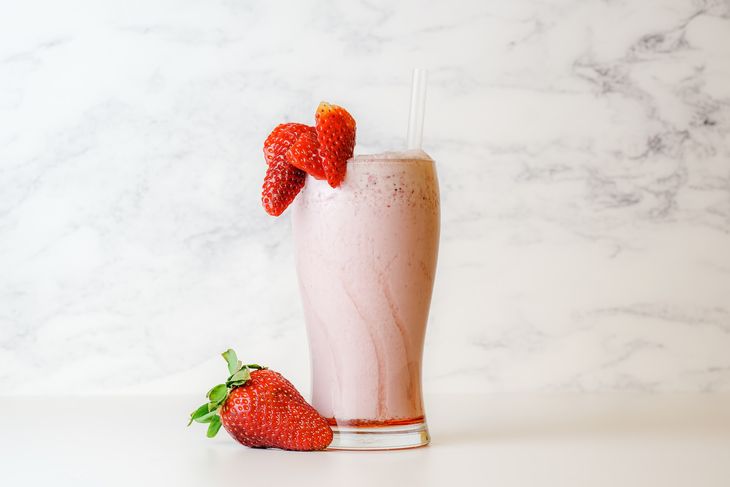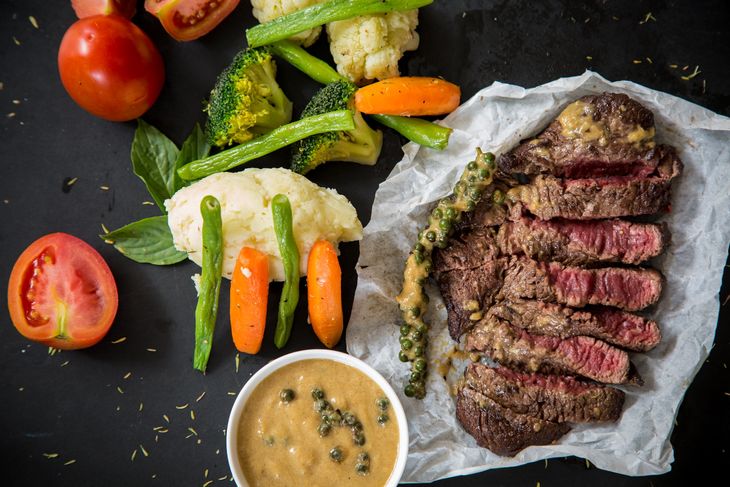Mark Felix: Supplements, Diet, and Best Lifts

At 6 feet 4 inches (193 cm) and 310 lb (140 kg), Mark Felix aims to consume at least 7,500 calories each day, as well as numerous supplements, to maintain his massive bulk. Below, we take a look at what supplements he takes, at what his diet consists of, and at some of his incredible lifting recordings.
Mark Felix: Supplements, Diet, and Best Lifts
So, what does Felix consume to prepare himself for training and to recover afterwards?
Mark Felix: Supplements
In an interview shared by personal trainer Matt Swaz, it’s revealed that Felix starts and ends the day with a swathe of supplements, including creatine, a pump enhancer, glutamine, branch chain amino acids (BCAAs), and essential fatty acids.

Why does Felix take these supplements?
Here are some of the benefits:
- Creatine: Has been shown to increase performance on a wide range of measures of anaerobic power, including bench press, leg press, and deadlift (you can learn more about the benefits of creatine supplementation here).
- Pump enhancer: A pump feels good. There’s also some evidence that L-arginine (a common component of pump enhancers) can improve athletic performance (Pahlavani et al., 2017).
- Glutamine: Can promote muscle recovery (Legault et al., 2015)
- BCAAs: Can increase anaerobic power, endurance, and perceptual–motor skills (you can find out more about the benefits of BCAA supplementation here).
- Essential fatty acids: Can reduce joint pain and stiffness (Goldberg & Katz, 2007).
In an interview with Muscle and Fitness, Felix mentions that he also takes a multivitamin and glucosamine to help with his joints.
I limit my caffeine intake and use it when I need it pre-training or on competition days – Mark Felix
Mark Felix: Strongman Diet
According to the aforementioned interview, a normal day of eating for Felix during a typical training week looks something like this:
- Breakfast: (all of the supplements above as well as…) Weetabix with milk
- Snack 1: Green tea, fruit, salad
- Lunch: Eggs or tuna with wholemeal bread, high-protein jelly
- Snack 2: Fruit and a whey protein shake
- Before workout: A pre-workout
- Dinner: Steamed vegetables with chicken or salmon
- Snack 3: (all of the supplements above as well as…) peanut butter on wholemeal bread
[I don't eat] as much meat as people might think – Mark Felix

In an interview with bodybuilding.com, Felix says he’ll also take meal replacements and protein bars during competitions and when travelling.
When we're lifting all day, I'll eat anything that’s nutrient-dense and easy to consume. – Mark Felix
Mark Felix: Best Lifts
With his huge hands (spanning 13 inches or 33 cm) and almost unrivalled grip strength, one of the strongman events for which Mark Felix is best known is the Hercules hold, which involves holding up two 352-lb (160-kg) pillars for as long as possible. Here’s a video of a 53-year-old Felix setting the world record at Giants Live.

His best deadlift in a competition is 925 lb (420 kg), which he did at the 2016 World Deadlift Championships.
Outside of competition, his personal bests include a 530-lb (240-kg) bench press and a 770-lb (350-kg) squat.
Mark Felix: Competition Results and Career Highlights
Arnold Strongman Classic: The highest Mark has finished at the event is 6th (2011 and 2013). (He set a new world record for the Dinnie stone hold at the event in 2020, his last time at the event, holding a 144-kg stone in one hand and a 188-kg stone in the other for 31 seconds. His best performance on the Atlas stones was during the 2011 version of the event when he lifted a 243-kg stone over a 4-ft bar.)
Britain's Strongest Man Contest: Mark came in 2nd on four occasions (2006, 2007, 2015, 2016). (Britain's Strongest Man was his first strongman competition, which he entered in 2004, finishing 6th.)
England's Strongest Man: Mark's best finish came in 2004, when he came 3rd.
Europe's Strongest Man Contest: The highest position Mark achieved was 3rd (2010, 2015).
IFSA British Championship: Mark won the event in 2005.
Rolling Thunder World Championship: Mark won the event in 2008 and 2009. (This competition involves doing a one-handed deadlift with a handle that rotates.)
Vice Grip Viking Challenge: Mark won the event in 2011 and 2012.
World's Strongest Man Competition (WSM Competition): Mark's best result came in 2006 when he finished in fourth place.
Mark Felix: Other
- As well as for his strength, Felix has become known for his amazing longevity. Born in 1966, he was 38 years old when he first qualified for the World’s Strongest Man contest (WSM contest) in 2004. Subsequently, he qualified almost every year up to and including 2023, when he made his final appearance at the competition (held at Myrtle Beach) at 57 years of age. Unsurprisingly, he was the oldest strongman at the event and was 16 years older than the next oldest competitor (Brian Shaw).
- Weaker events for Felix included the log press and axle press, though he still recorded 160-kg and 165-kg lifts in these events in competition.
- His strongman event training usually involves doing 3–4 sets with 3–5 reps.
- Felix was born and raised in Grenada but moved to the United Kingdom in his early 20s.
- Outside of competition, Mark Felix makes a living as a plasterer.
Final Thoughts
If you liked this article, you might also be interested in this one on the supplements of some of the strongest men in the world (e.g., Brian Shaw, Tom Stoltman) or this one about the supplements, diet, and best lifts of Martins Licis (WSM winner in 2019). You might also like this article on Mitchell Hooper, WSM winner in 2023.
You might also like these articles comparing BCAAs with creatine, BCAAs with glutamine, and BCAA pills and powders.
As an Amazon Associate, the site earns from qualifying purchases.
About the Author
Dave Robinson, a co-founder of ukfitness.pro, has a background in psychology (BSc) and neuroscience (MSc, PhD). As well as strength training, he enjoys endurance challenges and has run ultramarathons, cycled across several countries, and completed the Three Peaks Challenge. When writing, he draws on scientific evidence to understand the pros and cons of different diets, supplements, and training regimes.
References
Goldberg, R. J., & Katz, J. (2007). A meta-analysis of the analgesic effects of omega-3 polyunsaturated fatty acid supplementation for inflammatory joint pain. Pain, 129(1-2), 210–223. https://doi.org/10.1016/j.pain.2007.01.020
Legault, Z., Bagnall, N., & Kimmerly, D. S. (2015). The influence of oral L-glutamine supplementation on muscle strength recovery and soreness following unilateral knee extension eccentric exercise. International Journal of Sport Nutrition and Exercise Metabolism, 25(5), 417–426. https://doi.org/10.1123/ijsnem.2014-0209
Pahlavani, N., Entezari, M. H., Nasiri, M., Miri, A., Rezaie, M., Bagheri-Bidakhavidi, M., & Sadeghi, O. (2017). The effect of l-arginine supplementation on body composition and performance in male athletes: a double-blinded randomized clinical trial. European Journal of Clinical Nutrition, 71(4), 544–548. https://doi.org/10.1038/ejcn.2016.266